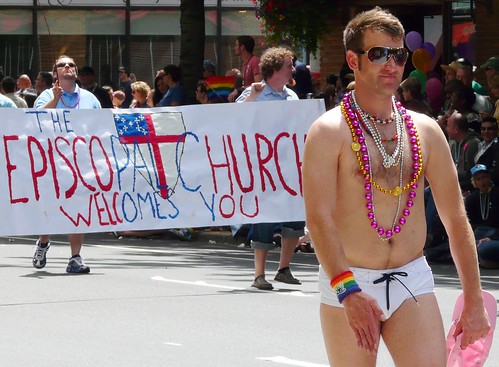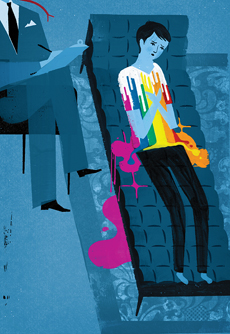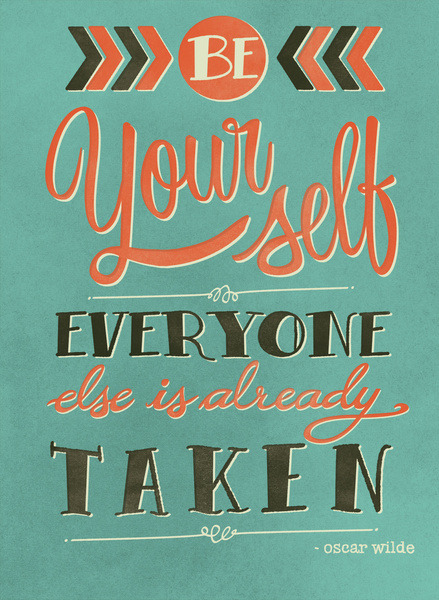I was a closeted gay teen in the nineties and initially I
was presented two possibilities about what would happen if I came out as a gay
man. My Anglo-Catholic mentors, with whom I was out inside the confessional
booth, opened up the possibility of monastic celibacy and discernment towards
the priesthood. The broad and low church clergy and leaders with whom I had
contact spoke of reparation therapy. Eventually I discovered Integrity. They
offered me a third option. I could be an out gay man, I could have a partner, I
could be a priest… as long as everything about my life mirrored that of the
heterosexual norms of the church.
 |
| Where does our welcome end? |
If these three modes were characters on a improve stage, the comedy would be
flat. Decades before I was born they stopped being able to be receptive to one
another. Where once there might have been space for dialogue, growth, and
understanding there is now only space for stimuli-response. Every group exists with
its own cultured positivism, the surety that they have the authority on the
subject at hand and the right actions to perform. They have created immutable
concepts of orthodoxy and orthopraxy from which they shan’t be moved. It a
stalwart example of the decadent heresy of partisanship in which the church so
regularly bathes.
Now, to be clear, I realize that I am painting with a broad brush and at points
doing a disservice to members and subsets of the various groups. This account
is based on my personal experience with groups over decades, striving to
process these experiences with peers, and quite often finding my experiences
echoed back to me. It comes out of a continued longing for a safe place in the
church for myself and also those around me, queer or otherwise, and the
frustration I feel about not finding such a space. The consistent reality that I have had to
face is a need to choose a side and know that alignment with one means
ostracization, if not worse, from the other.

I want to start then by going back to before these three
groups had devolved to less than improv characters on a stage.
I want to, in fact, go back to 1963, a decade
before homosexuality would stop being treated as a mental disorder by the
American Psychiatric Association. A time when we were legitimately still asking
whether homosexuality was as natural as heterosexuality or if it was a
problematic acquisition from the natural heterosexual state. It was at this
point which a rather wonderful dense text was published by Martin Thornton:
English Spirituality.
Now this text is, at its heart, an attempt to create an Anglo-Catholic reading
of English History. It is not a text attempting to engage pressing social
issues of its era. There comes a point, however, where Thornton is attempting
to clarify the theological methods of Tomas Aquinas and chooses to bring up a
question of his time. He chose to address the issue of homosexuality, and
wrote:
“It is difficult to distinguish between innate characteristics, or “nature”,
and acquired habits formed by circumstances. This difficulty must be accepted
and its subtlety recognized, but the doctrine remains. Homosexuality is an
example, for this can be almost subconsciously acquired, as a developing
tendency, or it can be an innate characteristic. In the former case, the
tendency should be fought, for it is but an excrescence upon nature; in the
latter case it is part of nature, which can be accepted and ultimately
sanctified. What must be avoided is the abominable heresy that the “Christian
Character” implies a rigid uniformity; that rather than sanctifying our own
God-made selves we should ape some other real or imaginary character”
(English Spirituality, Wipf and Stock, 1963, page 133.)
Finding this paragraph in my late teens was a God send for
me. It provided me an approach to theological and spiritual dissonance around
my faith and sexuality that gave me a balm of peace I had not known in my
entire life. Unfortunately my finding of it was not well received by any of the
three groups. The Anglo-Catholics, who had introduced me to Martin Thornton,
did not want to engage the possibility his approach would allow for a change in
their approach towards homosexual individuals. The broad and low churchmen were
not exceptionally interested in any argument based in Thomism. Those in and
about Integrity were strongly advocating I stop caring about Thornton, Aquinas,
or any of the tradition that challenged the concept of including conforming
members of the LGBTQ+ community.

The resistance is understandable as what Thornton puts
forward strongly critiques all three. Its first critique is towards those who
consider homosexuality to be an acquired deviation. Thornton was still using a
theory of Freud that some individuals took up homosexuality as an acquired
trait. Even though Freud himself noted it was inherently impossible to “cure”
homosexuality many have
attempted this impossibility. As our scientific
understanding of sexuality has grown since 1963 it is now recognized that
sexuality and sex are naturally formed by a complex series of factors we do not
fully understand and are not acquired traits. At this point what science has
revealed to us is that individual’s who acquire LGBTQ+ identities as a
developed trait, if they exist at all, are an exceptionally small minority
subset of the LGBTQ+ community. That across the board individuals who identify
in the midst of the LGBTQ+ community are expressing their natural
characteristics.
To state this in another way, for a long time we considered members of the
LGBTQ+ community to be guilty of acquiring their LGBTQ+ identity unless proven
otherwise. At this point medical science has shown, repeatedly, that an LGBTQ+
identity can be taken as an inherit naturally occurring characteristic of an
individual with the rare exception being a case of acquired psychosis. Our
theological and pastoral response to the LGBTQ+ community must be based on the
idea that their characteristics are inherently part of their nature.
The next twist we have to deal with is recognizing that the
Anglo-Catholic response I encountered and the response from Integrity are, in
fact, the same response. Both groups take LGBTQ+ identity to be an inherent
trait in need of sanctification. Their difference is simply in the allowable
mechanisms for that sanctification. Both expect “that the ’Christian Character’
implies a rigid uniformity” and that conforming to this uniformity will bring
about sanctification. The Anglo-Catholic expectation being those not called to
biologically procreative sex must conform to a call to monasticism, or at least
celibacy. What Integrity has sought is that LGBTQ+ individuals and families be
able to conform to the rigid uniformity of individuals and families already
existing in the Episcopal Church. Members of the LGBTQ+ community who can
readily conform to expected gender expressions, norms, and family systems we
already have in our church should be free to do so. What happens if someone does not pass well in their gender expression, of if that expression is not a clear choice of either male or female... what happens if there is a twenty or thirty year age difference between spouses... what happens if someone's black slacks are neoprene not wool...

Creating a space in which people are allowed to sanctify
their own selves and not ape some other real or imaginary character is a
difficult process. LGBTQ+ individuals cannot be expected to ape real or
imagined characters of the non-LGBTQ+ community. Our theological and pastoral
approach to them has to recognize their capacity to sanctify their own selves
within our communities. Yes, this means that some LGBTQ+ individuals will be
called to celibacy and monastic life. Yes, this means that some LGBTQ+ couples
will be called to monogamy and married life. Yes, this means that some LGBTQ+
individuals are naturally going to assimilate into expectations of Episcopal
norms. These are real characters of being across the spectrum. The issue is
that the Episcopal Church is not called to be a safe space just for those
people, LGBTQ+ and elsewise, for whom our norms is the real character of their
being… The Episcopal Church is called to create the community that allows
individuals to sanctify their God-made selves, to become Christian Characters,
not ape our preexisting notions of “Christian character”.
The reality, at least from what I hear from my peers who are the younger leaders of the Episcopal Church, is that we want a church that takes
both the historic voices of the church and the current voices of the LGBTQ+
community seriously. That there is a recognition that the “Christian character”
espoused by any one group, Thomists, Integrity, or other… is going to have some
major problems to it. That the goal of Christian Community is to bring
individuals to a point where they can be open to sanctifying their God-made
selves and place aside a set of expectations to which we must conform and ape.
Until we can move beyond the expectations of positivism, that one group or
individual has it right, we will continue to cut individuals off from a space
where they can experience sanctification.





